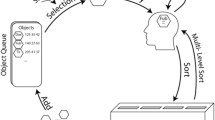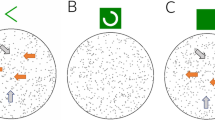Abstract
Strategies are a major component of increasing expertise and performance in complex tasks. High performers often have better strategies than low performers even with similar practice. Relatively little research has examined how people form and modify strategies in tasks that permit a large set of possible strategies. One challenge with such research is determining strategies based on behavior. We have developed an algorithm that accurately identifies the strategies that people employ in a complex decision-making task based on task behavior. In this paper, we report different methods to identify strategies that human participants are using in a complex decision-making task and document the efficacy of our methods. Participants have difficulty applying strategies consistently and thereby fail to gain useful performance-related feedback about the strategy’s effectiveness. A further challenge is to identify the optimal strategy to use as the properties of the task change over time. We refer to these challenges as strategy consistency and strategy adaptivity. These analyses have led to the construction of a strategy coaching module that enhances the task interface to support consistent application of a strategy and identification of suboptimal strategies. We report initial data on the effectiveness of this strategy coaching module.
Access this chapter
Tax calculation will be finalised at checkout
Purchases are for personal use only
Similar content being viewed by others
References
Schunn, C.D., McGregor, M.U., Saner, L.D.: Expertise in ill-defined problem solving domains as effective strategy use. Mem. Cogn. 33, 1377–1387 (2005). https://doi.org/10.3758/BF03193370
Lovett, M.C., Anderson, J.R.: History of success and current context in problem solving. Cogn. Psychol. 31, 168–217 (1996)
Anderson, J.R., Bothell, D., Byrne, M.D., Douglass, S., Lebiere, C., Qin, Y.: An integrated theory of the mind. Psychol. Rev. 111, 1036–1060 (2004)
Lovett, M.C., Schunn, C.D.: Task representations, strategy variability, and base-rate neglect. J. Exp. Psychol. Gen. 128, 107–130 (1999)
Klahr, D., Dunbar, K.: Dual space search during scientific reasoning. Cogn. Sci. 12, 1–48 (1988)
Simon, H.A., Lea, G.: Problem solving and rule induction: a unified view (1974)
Prezenski, S., Brechmann, A., Wolff, S., Russwinkel, N.: A cognitive modeling approach to strategy formation in dynamic decision making. Front. Psychol. 8, 1335 (2017)
Schunn, C.D., Lovett, M.C., Reder, L.M.: Awareness and working memory in strategy adaptivity. Mem. Cogn. 29, 254–266 (2001). https://doi.org/10.3758/BF03194919
Moon, J., Betts, S., Anderson, J.R.: Individual differences and workload effects on strategy adoption in a dynamic task. Acta Psychol. (Amst.) 144, 154–165 (2013)
Joslyn, S., Hunt, E.: Evaluating individual differences in response to time-pressure situations. J. Exp. Psychol. Appl. 4, 16–43 (1998)
Bai, H., Jones, W.E., Moss, J., Doane, S.M.: Relating individual differences in cognitive ability and strategy consistency to interruption recovery during multitasking. Learn. Individ. Differ. 35, 22–33 (2014)
Pedregosa, F., et al.: Scikit-learn: machine learning in python. J. Mach. Learn. Res. 12, 2825–2830 (2011)
Oh, H., Beck, J.M., Zhu, P., Sommer, M.A., Ferrari, S., Egner, T.: Satisficing in split-second decision making is characterized by strategic cue discounting. J. Exp. Psychol. Learn. Mem. Cogn. 42, 1937–1956 (2016)
Azevedo, R., Hadwin, A.F.: Scaffolding self-regulated learning and metacognition - implications for the design of computer-based scaffolds. Instr. Sci. 33, 367–379 (2005)
Author information
Authors and Affiliations
Corresponding author
Editor information
Editors and Affiliations
Rights and permissions
Copyright information
© 2020 Springer Nature Switzerland AG
About this paper
Cite this paper
Moss, J., Bradshaw, G., Wong, A., Durriseau, J., Newlin, P., Barnes, K. (2020). Tracking and Improving Strategy Adaptivity in a Complex Task. In: Schmorrow, D., Fidopiastis, C. (eds) Augmented Cognition. Human Cognition and Behavior. HCII 2020. Lecture Notes in Computer Science(), vol 12197. Springer, Cham. https://doi.org/10.1007/978-3-030-50439-7_29
Download citation
DOI: https://doi.org/10.1007/978-3-030-50439-7_29
Published:
Publisher Name: Springer, Cham
Print ISBN: 978-3-030-50438-0
Online ISBN: 978-3-030-50439-7
eBook Packages: Computer ScienceComputer Science (R0)




